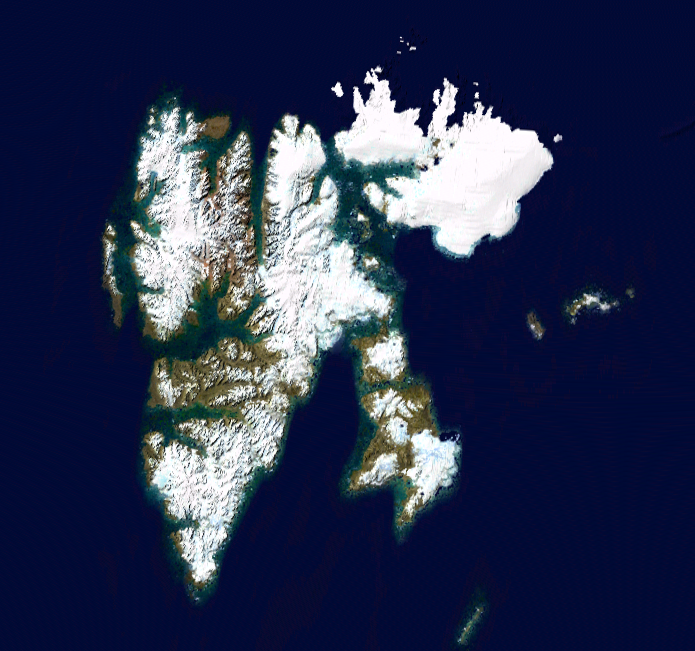
http://en.wikipedia.org/wiki/Svalbard
BLURB:
"Svalbard is an archipelago in the Arctic Ocean north of mainland Europe, about midway between Norway and the North Pole. It consists of a group of islands ranging from 74° to 81° North, and 10° to 35° East. The archipelago is the northernmost part of Norway. Three islands are populated: Spitsbergen, Bear Island and Hopen. The largest settlement is Longyearbyen. The Svalbard Treaty recognises Norwegian sovereignty over Svalbard and the 1925 Svalbard Act makes Svalbard a full part of the Norwegian Kingdom."
REVIEW:
I'd never heard of Svalbard until today! While perusing a world map and looking at various little islands and forgotten countries, I found a place called Svalbard, and as I do whenever I want to find out more about something, I hit Wikipedia.
Who knew that Svalbard has a doomsday seed vault bank to store seeds from as many of the world's crop varieties and their botanical wild relatives as possible? Or that it has a unique road sign warning people about polar bears over all of Svalbard? It sounds mighty chilly, too, with an average summer temperature of 5°C and in winter, −12 °C.
I didn't know all of this, and I'm going to blame the stupid curriculum in place for educating Australian students about history and geography. It seems that Australia is (once again) mimicking America in thinking that most of the stuff outside of Australia and it's immediate neighbours doesn't really matter. In grades 9 and 10, we only study Australian history (a lot of which is usless - 'Australian Life between 1900 and 1920'. Try finding books about that, it's almost impossible!) and Australian geography (which isn't really geography as most people know it - we learn about coastal ecosystems and...I can't even remember what else, but certainly not where in the world stuff is.) I feel so ignorant not knowing basic facts that my parents' generation know - I only found out recently who actually won World War 2 (I had a rough idea though) and for a long time I thought Rome was a country. Despite this, I was runner-up dux of my grade in year 10.
Of course, there's nothing stopping me getting my own education about worldly facts via the Internet. But who could be bothered to do that unless they had a piqued interest in world history and geography? Not me.
I'm not saying every Australian student should learn about Svalbard, though. However it was interesting.
RATING: Wikipedia is, more often than not, biased and inaccurate. But I learnt about Svalbard. 3 STARS
BLURB:
"Svalbard is an archipelago in the Arctic Ocean north of mainland Europe, about midway between Norway and the North Pole. It consists of a group of islands ranging from 74° to 81° North, and 10° to 35° East. The archipelago is the northernmost part of Norway. Three islands are populated: Spitsbergen, Bear Island and Hopen. The largest settlement is Longyearbyen. The Svalbard Treaty recognises Norwegian sovereignty over Svalbard and the 1925 Svalbard Act makes Svalbard a full part of the Norwegian Kingdom."
REVIEW:
I'd never heard of Svalbard until today! While perusing a world map and looking at various little islands and forgotten countries, I found a place called Svalbard, and as I do whenever I want to find out more about something, I hit Wikipedia.
Who knew that Svalbard has a doomsday seed vault bank to store seeds from as many of the world's crop varieties and their botanical wild relatives as possible? Or that it has a unique road sign warning people about polar bears over all of Svalbard? It sounds mighty chilly, too, with an average summer temperature of 5°C and in winter, −12 °C.
I didn't know all of this, and I'm going to blame the stupid curriculum in place for educating Australian students about history and geography. It seems that Australia is (once again) mimicking America in thinking that most of the stuff outside of Australia and it's immediate neighbours doesn't really matter. In grades 9 and 10, we only study Australian history (a lot of which is usless - 'Australian Life between 1900 and 1920'. Try finding books about that, it's almost impossible!) and Australian geography (which isn't really geography as most people know it - we learn about coastal ecosystems and...I can't even remember what else, but certainly not where in the world stuff is.) I feel so ignorant not knowing basic facts that my parents' generation know - I only found out recently who actually won World War 2 (I had a rough idea though) and for a long time I thought Rome was a country. Despite this, I was runner-up dux of my grade in year 10.
Of course, there's nothing stopping me getting my own education about worldly facts via the Internet. But who could be bothered to do that unless they had a piqued interest in world history and geography? Not me.
I'm not saying every Australian student should learn about Svalbard, though. However it was interesting.
RATING: Wikipedia is, more often than not, biased and inaccurate. But I learnt about Svalbard. 3 STARS


No comments:
Post a Comment